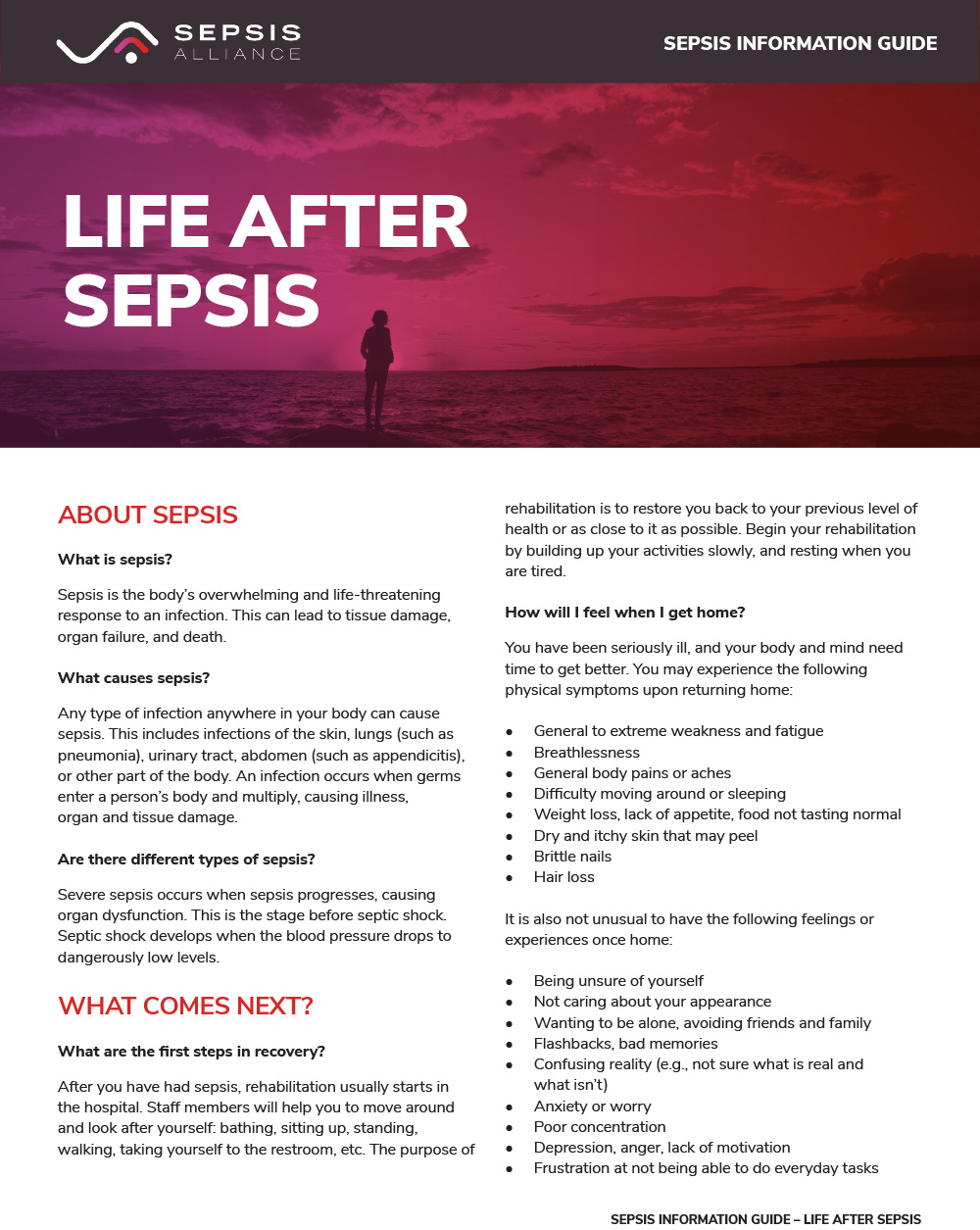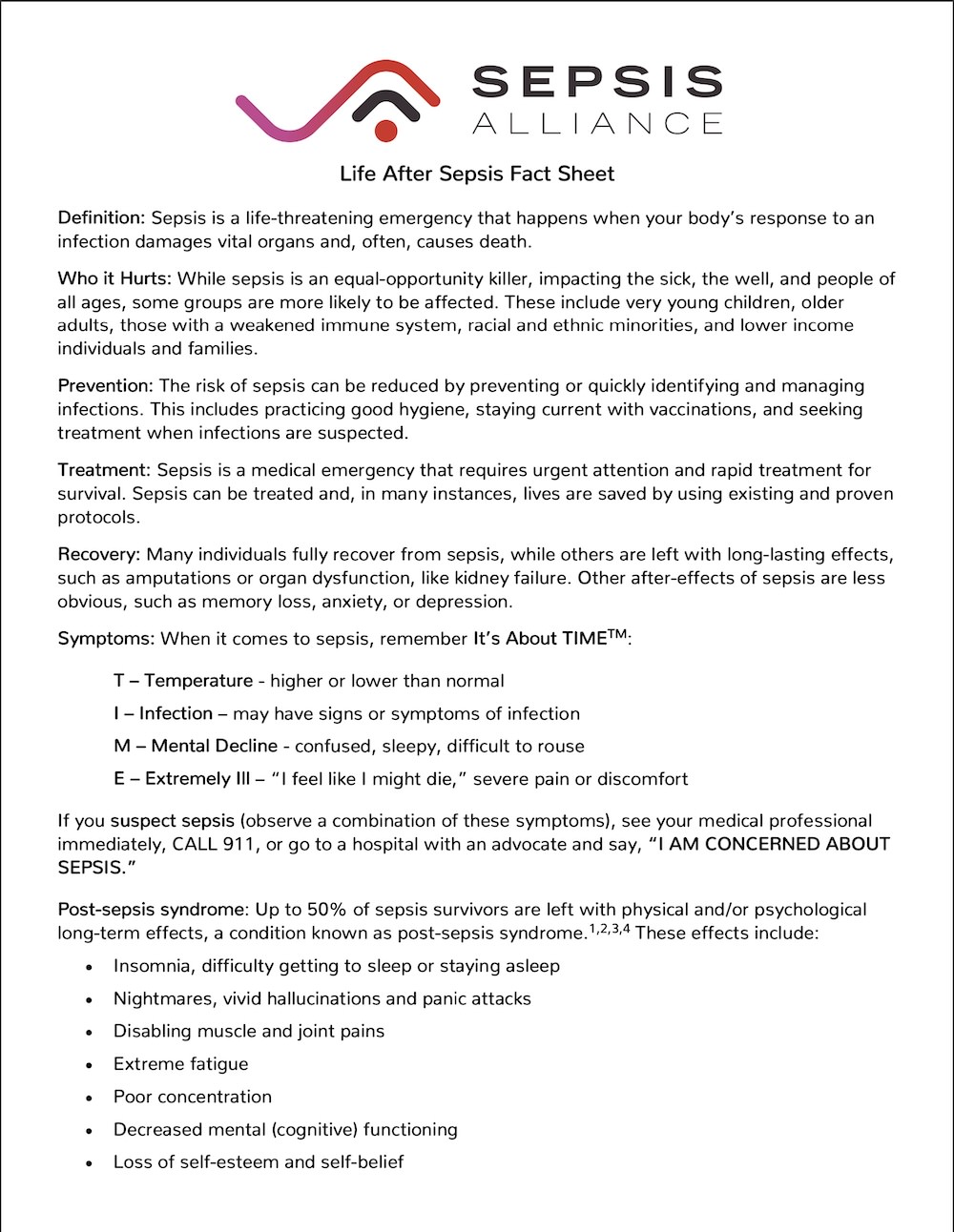Being discharged from the hospital is a good day for most people, but it can also be stressful. Post-sepsis life can have challenges, especially if you have been left with long-term problems related to your illness. Some sepsis survivors recover completely and resume their lives, while others may struggle to cope, something no one expected.
Here you can find information to help you navigate post-sepsis life.
Starting in 2019, Sepsis Alliance added to the awareness efforts by launching Sepsis Survivor Week, which focuses on the survivors and the challenges they may face. Click here to learn more about Sepsis Survivor Week.
FAQ
Our Frequently Asked Questions (FAQ) section addresses many questions related to sepsis and life after sepsis. Survivors and their family and friends can find answers to questions, such as can I get sepsis again, why am I so tired, and can sepsis be prevented? You may also find our Life After Sepsis Information Guide helpful in explaining some of the issues that could last long after discharge from the hospital.
KNOW THE SEPSIS FACTS
Many researchers are working to learn more about what causes sepsis, how it affects patients, and life after sepsis. Learn more about the facts and statistics in the Life After Sepsis Fact Sheet.
AFTER DISCHARGE FROM THE HOSPITAL
Once you have been discharged from the hospital, it may seem that you’ve been left to fend for yourself. Discharge instructions are sometimes rushed or may be incomplete, or you may not think of the questions you need to ask. To help you with the hospital to home or hospital to rehab transition, Sepsis Alliance has put together a checklist with the most common issues that come up. Click here for the list.
We have also created a discharge kit for those being released from the hospital after COVID-19. Download the guide here.
Since sepsis survivors are at risk for repeat infections, you should also speak with your doctor about any vaccinations that you may need to reduce the likelihood of getting another infection. You can read about these vaccines at the Centers for Disease Control and Prevention (CDC), the World Health Organization (WHO), and the European Center for Disease Prevention (ECDP), which provide schedules for adults and children. You can also learn more at Prevention: Vaccines. Regaining your health after sepsis can also be slow, but good nutrition can help you along the way. Learn more about nutrition after sepsis here.
CONNECT WITH OTHER SEPSIS SURVIVORS
Sepsis Alliance Connect is a virtual support community designed for the millions of people affected by sepsis. Click here to learn more or to sign up.
LEARNING ABOUT POST-SEPSIS SYNDROME (PSS)
Many people who spend time in an intensive care unit (ICU) develop problems like post-traumatic stress disorder (PTSD). Those who were treated for sepsis may develop not only PTSD, but other problems as well. You can learn more about PSS here and PTSD here.
COPING WITH MENTAL HEALTH ISSUES
Your mental health is a vital part of your overall recovery. If you find yourself struggling with anxiety, depression, or any other mental health issue and you don’t know where to turn, visit our Mental Health Resources page for a list of organizations that may help you.
EXPLAINING POST-SEPSIS ISSUES TO OTHERS
If you are experiencing problems after your discharge, either physical, cognitive, or psychological, you may find it difficult to explain. To help explain post-sepsis issues, Sepsis Alliance has written letters that explain sepsis and PSS to:
CONDITIONS THAT CAN CAUSE SEPSIS
Anyone can develop sepsis, but some people are at higher risk, including sepsis survivors. Learn how sepsis is associated with various conditions, such as diabetes or cancer in our Sepsis and… library.
Updated June 13, 2025.






































